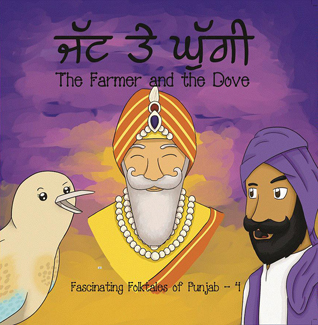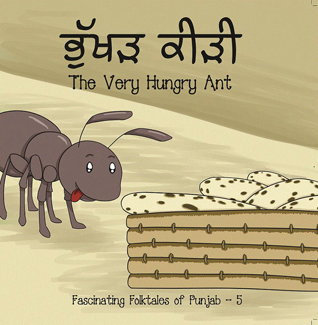Kids' Corner
Introducing
Two New Volumes of
Fascinating Folk Tales of Punjab
A Review by MANMEET KAUR
“Mainu Punjabi bilkul samajh aandi hai, mai parrh sakdi haa(n), par Punjabi bolna mushkal hai.” - ‘I totally understand Punjabi, I can read it too, but I’m unable to speak it.’
I cannot count the number of times I have had a conversation on this topic with a Punjabi cab driver. I then try to shift the topic to conversations that my limited tongue will wrap itself around in my own mother tongue, such as, “Tussee kithhey rehende ho? Kitne bacche hain ji?”
So many of us have had this apologetic conversation repeatedly. I always leave them with feeling of regret for not being a stronger Punjabi speaker.
I grew up listening to my parents speak in Punjabi, but like so many children of immigrants, I would respond in English. It was easier and I didn’t have a regular community of Punjabi speakers around me. In fits and spurts, I have tried to teach myself the language of my people since high school, but I still cannot claim to have fluency.
When I became pregnant with Hukam Singh three years ago, I tried to squeeze in extra time to review Punjabi grammar books. Upon Hukam’s birth, I made a promise to myself that I would only speak to him in Punjabi.
It has been an exhausting 2 years and 2 months. With help from family and friends, I have been translating Hukam’s children’s books and children’s songs into Punjabi. I have hounded Punjabi speaking family members to only speak in Punjabi around him. I have sometimes spent periods of time not saying anything to him because my sleep deprived head was too tired to process my thoughts to him in Punjabi.
Shortly after Hukam‘s birth, he was given a gift: “Fascinating Folktales of Punjab” – three beautifully designed, board books written by Gurmeet Kaur. I have scoured the Internet for Punjabi books for children, and there is nothing that compares.
Hukam loves books. He memorizes all his favorite books. He narrates stories about his beloved characters and often has conversations by himself with the characters in his books. Each of the ‘Fascinating Folktales of Punjab’ books communicate deep life lessons in a way that is age appropriate and sparks much conversation with our toddler.
The first three books covered the topic of persistence and patience (Chirri te Pippal), fairness and hard work (Chirri te Kaa’n), and courage despite all odds triumphs (Lelaa te Dhol).
Hukam’s oversized sense of empathy is particularly drawn to stories in which a character has encountered struggle and then emerges happy.
Today ‘Fascinating Folktales of Punjab’ is launching the fourth and fifth board books of their series of beautifully crafted children’s folk stories – Jatt te Ghhughee (The Farmer and the Dove) and Bhukhrrh Keerree (The Very Hungry Ant).
Hukam was thrilled to receive the new books – and the timing was perfect. Now that he is over two years old, his comprehension has grown and the two latest books are growing with him.
The moral of each story in these books is more advanced. In ‘Bhukhrrh Keerree,’ Keerree’s greed for food is representative of our society’s greed for resources. When Hukam expresses greed or wastefulness in his interactions with other children, I call upon characters like Keerree to help explain complex subjects like the importance of conserving and sharing resources with others.
Through Jatt te Ghhughee (arguably his favorite), he is developing a sense of empathy for the experience of injustice and then freedom. Tonight, we talked over dinner about Jatt te Ghhughee and as we walked through the story, he excitedly proclaimed, “Hun ghhughee azaadi mil gayee! Hun khush ho gayee!” (“Now the dove has achieved freedom! Now she is happy!”)
In the latest two books, Gurmeet Kaur has included words from folklore that are from the Guru Granth Sahib but are disappearing from present day, colloquial Punjabi. Further, she has retold the stories in an educationally rich way to meet everyday vocabulary needs, such as the sounds of animals and parts of the day. The translations and transliterations are included, so anyone in your home can enjoy reading the books with children.
Having bright, beautiful and meaningful Punjabi characters and stories in Hukam’s life has exposed him to folk stories that convey life lessons that are colored with Punjabi humor.
Through Gurmeet Kaur’s books, he is able to wrap layers of Punjabi culture and identity into his experience of the world, despite the fact that he was born in New York City and lives in Harlem.
I often look around the room when I encounter sangats in various parts of the country and wonder – how many people in this room will know how to speak in our mother tongue? How many will be able to read and understand the words of our Gurus?
I have still not achieved full fluency in Punjabi, but I am getting increasingly comfortable. I’m also becoming increasingly anxious as I continue to imagine a future in which more and more members of the Punjabi community within and beyond India are losing our ma boli (mother tongue).
Who will be there to pass down old folk stories in Punjabi? Who will help us understand bani? I am certain that had I been reading the ‘Folktales of Punjab’ as a child, my comprehension and appreciation for Punjabi would have started earlier.
Gurmeet Kaur’s contribution to Punjabi children, new parents, grandparents, and our entire community cannot be understated. She is bringing new life to folk stories from Punjab. Whether you are a new parent, a high school student, a grandparent, a young professional – I urge you to invest in these books by adopting a box of books, or at the very least, buying a set. Your nieces, nephews, children and grandchildren will thank you.
And they make great gift sets!
For more information, or to purchase, please CLICK here.
Manmeet Kaur lives and works in Harlem, New York, USA, with her husband, Prabhjot Singh and son, Hukam Singh. She founded and runs a population health organization, called City Health Works which hires and trains local health coaches to support their neighbors in achieving better health.
November 4, 2014
Conversation about this article
1: Rup Singh (Canada), November 04, 2014, 9:06 PM.
When there were no books and most people would be considered illiterate, they were able to pass on folktales, folk songs, and skills, among many things, just by talking. Nowadays it seems that by many, Punjabi isn't even spoken like it should. Through history we have examples where people were forced to give up their language and culture, but why are we doing it willingly? Are we losing ourselves in an effort to be accepted by others?
2: Roop Dhillon (Reigate, ), November 05, 2014, 5:45 AM.
Well done, Gurmeet. Keep it up. You will be rewarded.
3: Amardeep (USA), November 06, 2014, 4:18 PM.
Absolutely loved the previous set of books. Looking forward to buying this set. I believe when in our busy lives we have to teach so many things to our kids in the West, Sikhi and Punjabi language are musts. Punjabi culture may or may not come with them automatically and should be least important.






